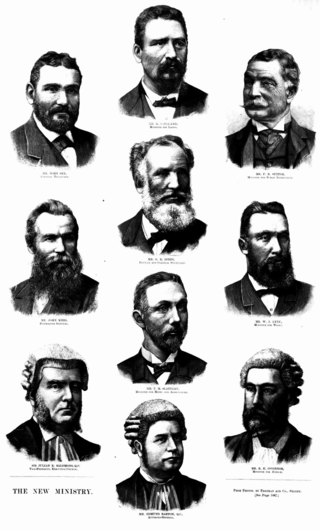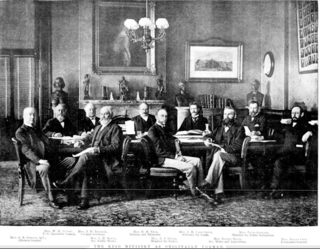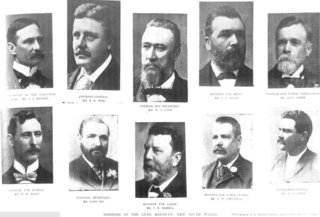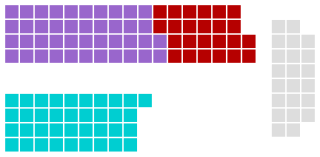Related Research Articles

John Lionel Fegan was a politician and coal miner in New South Wales, Australia.

Bernhard Ringrose Wise, commonly referred to as B. R. Wise, was an Australian politician. He was a social reformer, seen by some as a traitor to his class, but who was not fully accepted by the labor Movement. He said, "My failure in Sydney has been so complete—my qualities those which Australia does not recognise, my defects those which Australians dislike most." When he died, William Holman said, "There is hardly anything in our public life which we have to consider to-day that cannot be traced back to his brilliant mind and clear foresight … [Wise] held undisputed supremacy as the foremost debater, foremost thinker and foremost public man in the life of New South Wales".

Sir Joseph Palmer Abbott, was an Australian politician, pastoralist and solicitor.

Francis Clarke was an Australian politician.
This is a list of members of the New South Wales Legislative Assembly who served in the 17th parliament of New South Wales from 1895 to 1898. They were elected at the 1895 colonial election on 24 July 1895. The Speaker was Sir Joseph Abbott.
Members of the New South Wales Legislative Assembly who served in the 15th parliament of New South Wales held their seats from 1891 to 1894 They were elected at the 1891 colonial election between 17 June and 3 July 1891. The Speaker was Sir Joseph Palmer Abbott.

The third Dibbs ministry, the 27th ministry of the Colony of New South Wales, was led by Sir George Dibbs, leader of the Protectionist Party, following the 1891 New South Wales election, which saw the Labour Party win seats in the New South Wales Legislative Assembly and the balance of power. With no party having a majority, Sir Henry Parkes held on as Premier until October 1891 when he lost a vote in the Legislative Assembly, causing Parkes to resign as Premier and leader of the Free Trade Party. Dibbs formed the ministry on 23 October 1891, with Labour support, and comprised 10 ministers.

The Reid ministry was the 28th ministry of the Colony of New South Wales, and was led by the 12th Premier, George Reid. The title of Premier was widely used to refer to the Leader of Government, but was not a formal position in the government until 1920. Instead the Premier was appointed to another portfolio, usually Colonial Secretary but on this occasion Reid took the portfolio of Colonial Treasurer until July 1899 and then Attorney General.

The Lyne ministry was the 29th ministry of the Colony of New South Wales, and was led by the 13th Premier, Sir William Lyne, KCMG.
Bathurst, an electoral district of the Legislative Assembly in the Australian state of New South Wales, has continuously existed since 1859.

The 1901 New South Wales state election was held on 3 July 1901 for all of the 125 seats in the 19th New South Wales Legislative Assembly and it was conducted in single-member constituencies with a first past the post voting system. The Parliamentary Electorates Act of 1893 had conferred the right to vote on every male British subject over 21 years of age who was resident in New South Wales for a year or more. The 19th parliament of New South Wales was dissolved on 11 June 1901 by the Governor, Lord Beauchamp, on the advice of the Premier, John See.

The 1898 New South Wales colonial election was held on 27 July 1898 for all of the 125 seats in the 18th New South Wales Legislative Assembly and it was conducted in single-member constituencies with a first past the post voting system. Section 23 (1) of the Parliamentary Electorates and Elections Act of 1893 conferred a right to vote on 'every male person, being a natural born [British] subject, who shall have resided or had his principal place of abode in New South Wales for a continuous period of one year'. The 18th parliament of New South Wales was dissolved on 8 July 1898 by the Governor, Lord Hampden, on the advice of the Premier, George Reid.
The 1901 New South Wales state election was for 125 electoral districts, with each district returning one member. The election was conducted on the basis of a simple majority or first-past-the-post voting system. In this election, in 32 electorates the winning candidate received less than 50% of the votes, while 13 were uncontested. The average number of enrolled voters per electorate was 2,764, ranging from Wentworth (1,706) to Willoughby (4,854).
A by-election was held for the New South Wales Legislative Assembly electorate of Ashfield on 26 September 1899 because Bernhard Wise (Protectionist) had been appointed Attorney General. Until 1904, members appointed to a ministerial position were required to face a by-election. These were generally uncontested. Of the nine ministers appointed with the formation of Lyne ministry, Ashfield and Hume were the only electorates in which the by-election was contested.
Boorowa, an electoral district of the Legislative Assembly in the Australian state of New South Wales was created in 1880 and abolished in 1904.
East Sydney, an electoral district of the Legislative Assembly in the Australian state of New South Wales was created in 1859 and abolished in 1894.
Hume, an electoral district of the Legislative Assembly in the Australian state of New South Wales was created in 1894 and abolished in 1920.
Sydney-King, an electoral district of the Legislative Assembly in the Australian state of New South Wales, was created in 1894 and abolished in 1904.
Wentworth, an electoral district of the Legislative Assembly in the Australian state of New South Wales, was created in 1859 and abolished in 1904.
A by-election was held for the New South Wales Legislative Assembly electorate of The Hume on 10 September 1899 because William Lyne had been appointed Premier and Colonial Treasurer, forming the Lyne ministry. Until 1904, members appointed to a ministerial position were required to face a by-election. These were generally uncontested. Of the nine ministers appointed in the Lyne ministry, The Hume and Ashfield were the only electorates in which the by-election was contested.
References
- ↑ Green, Antony. "1898 Elected members". New South Wales Election Results 1856-2007. Parliament of New South Wales . Retrieved 14 April 2020.
- ↑ "Part 5B - Members returned for each electorate" (PDF). New South Wales Parliamentary Record. Parliament of New South Wales . Retrieved 20 April 2020.
- ↑ "Former members of the New South Wales Parliament, 1856–2006". New South Wales Parliament. Retrieved 14 April 2020.
- ↑ "Motion of censure". Parliamentary Debates (Hansard) . New South Wales: Legislative Assembly. 7 September 1899. p. 1308.
- ↑ Green, Antony. "Results of 1898–1901 by-elections". New South Wales Election Results 1856-2007. Parliament of New South Wales . Retrieved 6 May 2020.
